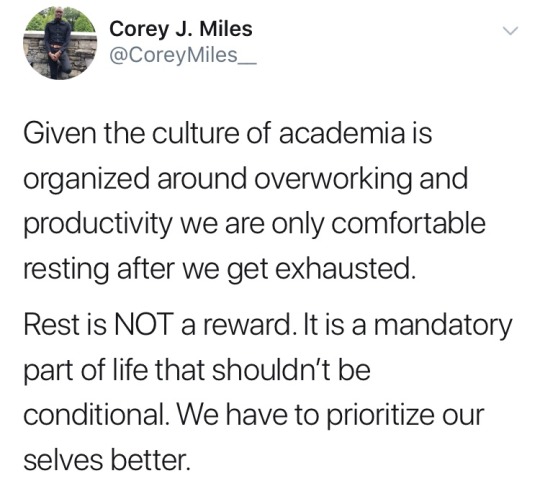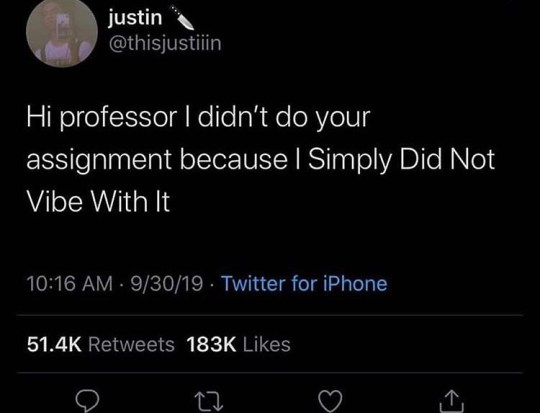20 | mechanical engineering student with an affinity for mechanics and mathematics
Don't wanna be here? Send us removal request.
Photo

lovin’ the way red, yellow and blue look together!
instagram / youtube
9K notes
·
View notes
Text

13.10.2019
The first examen commun of the year starts on the 21st and I am for some reason meh about it.
🎧Everything is gone, Tavito Nanao
539 notes
·
View notes
Text

04.10.2019
I don’t think I have a lesson that I don’t enjoy this year, but even than chemistry is definitely in my top 3 right now.
🎧Les Passants, ZAZ
1K notes
·
View notes
Text


some older accounting notes but I was living for the lighting ☀️
2K notes
·
View notes
Text
being in class is like *copies words off the board without understanding any of them* *drinks water* *looks at phone* *doesn’t know what’s going on* *zones out* *realizes 20 minutes have passed* *gets annoyed at people talking* *looks at phone* *drinks water*
63K notes
·
View notes
Text
“In theory, you can make a programming language out of any symbols. The computer doesn’t care. The computer is already running an invisible program (a compiler) to translate your IF or body into the 1s and 0s that it functions in, and it would function just as effectively if we used a potato emoji 🥔 to stand for IF and the obscure 15th century Cyrillic symbol multiocular O ꙮ to stand for body. The fact that programming languages often resemble English words like “body” or “if” is a convenient accommodation for our puny human meatbrains, which are much better at remembering commands that look like words we already know. But only some of us already know the words of these commands: those of us who speak English. The “initial promise of the web” was only ever a promise to its English-speaking users, whether native English-speaking or with access to the kind of elite education that produces fluent second-language English speakers in non-English-dominant areas.”
— Coding Is for Everyone—as Long as You Speak English (Gretchen McCulloch in Wired)
2K notes
·
View notes
Text
me: [closes an app that is running slowly] punishment………. execution
3K notes
·
View notes
Photo

‘A troubling choice’: authors criticise Peter Handke’s controversial Nobel win
Writers including Salman Rushdie, Hari Kunzru and Slavoj Žižek say the 2019 Nobel laureate ‘combines great insight with shocking ethical blindness’
Twenty years before Peter Handke would become a Nobel laureate, he won another title. In 1999, Salman Rushdie named him the runner-up for “International moron of the year” in the Guardian, for his “series of impassioned apologias for the genocidal regime of Slobodan Milošević”. (The winner was actor Charlton Heston, for being a gun lobbyist.)
The Austrian playwright, whose Slovenian heritage had inspired in him a fervent nationalism during the Balkans war, had publicly suggested that Sarajevo’s Muslims had massacred themselves and blamed the Serbs, and denied the Srebrenica genocide. Seven years after Rushdie’s scorching condemnation, in 2006, he would also attend war criminal Milošević’s funeral.
On Thursday, after the announcement of Handke’s win of the 9m Swedish krona prize (£786,000), Rushdie told the Guardian: “I have nothing to add today, but I stand by what I wrote then.”
The decision to award Handke the 2019 laureateship – alongside Poland’s Olga Tokarczuk for the 2018 medal – was widely criticised by observers as a broken promise on two fronts.
First, the Swedish Academy’s apparent commitment to be less “male-oriented” and “Eurocentric” just days before had been quickly proven false, with two European winners and only the 15th female laureate in 120 years. Secondly, having declared that the prize would take a fallow year to reassess its direction after a now infamous sexual harassment scandal, the academy had left observers hopeful that the Nobel would stop eliding controversy with intellectual rigour, and choose authors that could be praised for both their work and their politics.
“Handke is a troubling choice for a Nobel committee that is trying to put the prize on track after recent scandals,” said author Hari Kunzru, who has taught the laureate’s work to his students. “He is a fine writer, who combines great insight with shocking ethical blindness.”
Kunzru said he believed that Handke would have won the Nobel earlier, “had he not decided to act as a propagandist for the genocidal Milošević regime”. He added: “More than ever we need public intellectuals who are able to make a robust defence of human rights in the face of the indifference and cynicism of our political leaders. Handke is not such a person.”
Slavoj Žižek, Slovenian philosopher and longtime critic of Handke, told the Guardian: “In 2014, Handke called for the Nobel to be abolished, saying it was a ‘false canonisation’ of literature. The fact that he got it now proves that he was right. This is Sweden today: an apologist of war crimes gets a Nobel prize while the country fully participated in the character assassination of the true hero of our times, Julian Assange. Our reaction should be: not the literature Nobel prize for Handke but the Nobel peace prize for Assange.”
Slovenian author Miha Mazzini said: “Some artists sold their human souls for ideologies (Hamsun and Nazism), some for hate (Celine and his rabid antisemitism), some for money and power (Kusturica) but the one that offended me the most was Handke with his naivety for the Milošević regime. And it’s personal. I will never forget the cold winter when Yugoslavia was falling apart and there was nothing on the shelves of the stores. We were a young family and my daughter was a toddler and it was bitterly cold. I’d spent the whole day in the queue for the heating oil and in the evening, almost frozen, I started reading Handke’s essay about Yugoslavia. He wrote of how he envied me: while those Austrians and Germans, those westerners, had fallen for consumerism, we, Yugoslavs, had to queue and fight for everything. Oh, how close to the nature we were! How less materialistic and more spiritualised we were! Even at the time, I found him cruel and totally self-absorbed in his naivety.”
And in a statement issued on Thursday, novelist Jennifer Egan, president of literature and human rights organisation Pen America, said that while Pen “does not generally comment on other institutions’ literary awards … today’s announcement must be an exception.
“We are dumbfounded by the selection of a writer who has used his public voice to undercut historical truth and offer public succor to perpetrators of genocide, like former Serbian President Slobodan Milosevic and Bosnian Serb leader Radovan Karadzic,” Egan continued. “We reject the decision that a writer who has persistently called into question thoroughly documented war crimes deserves to be celebrated for his ‘linguistic ingenuity.’ At a moment of rising nationalism, autocratic leadership, and widespread disinformation around the world, the literary community deserves better than this. We deeply regret the Nobel Committee on Literature’s choice.”
Handke’s politics have long been derided by former friends and authors. In 2008, novelist Jonathan Littell remarked: “He might be a fantastic artist, but as a human being he is my enemy … he’s an asshole.” Alain Finkielkraut called him “an ideological monster”, while Susan Sontag, who spent several months in Sarajevo during the Bosnian war staging a performance of Waiting for Godot, said Handke’s comments had “finished” him among his former friends in New York.
Dr Helen Finch, associate professor in German at the University of Leeds, praised Handke’s ability to explore “the fringes of human experience in an extraordinary way and for his “early and complex form of ecopoetics”, but said his Nobel win “shows that the prize committee is still infatuated by white European men writing in an elitist poetic tradition, and is cloth-eared to the political complicity of those men”.
Some were pleased by Handke’s win, however: Serbian media lined up to praise the decision, calling Handke a “great friend”, while Austrian president Alexander Van der Bellen called Handke’s voice “unfussy and unique … We have a lot to thank Peter Handke for. I hope he knows that.”
Daily inspiration. Discover more photos at http://justforbooks.tumblr.com
14 notes
·
View notes
Text
tips to get your life back on track after a breakdown™
sleep. your body needs to rest. the average panic attack takes as much energy as running a half-marathon. let yourself rest. take a 20 minute nap. any longer and you’ll hit your REM cycle, and you’ll wake up worse off. after, you’ll feel so much better.
clean something. literally anything. a plate, a drawer, the whole mf bathroom. it doesn’t matter how much or how little. it’ll make you feel more in control, and it’ll make your surroundings more appropriate for recovery.
get some fresh air. even just opening your window for a few hours will help. if you feel up to it, take a walk. take your dog. pick some flowers. cloudgaze. even just sit in your garden for a bit. your body will thrive off of non-stale air.
eat and drink. I know for some people, myself included, this is Hard. it’s alright if all you can manage is a granola bar, or some cereal. anything is progress and will fuel your body. drink water if you can, but anything apart from alcohol will hydrate you.
take a shower. I have clinical depression. have done since I was 12. I know how hard it is to take a shower. but it fucking helps. if you don’t do anything else off this list, do this. it’ll help more than you know.
talk to someone. I can’t stress this enough. humans are social creatures! we crave interaction. even the most introverted introvert needs to talk to someone. call your mom. text a buddy. skype your brother. chat to your local cashier. anything !! you’ll feel less alone, and hopefully get some good serotontitty flowing.
do something fun! same as above, it’ll make u feel so much bette, and provide a distraction. some good options are writing, drawing, watching a movie, dancing - anything you enjoy!
be kind to yourself. it’s okay if you relapsed, or if you had a bad day, or anything else. treat yourself gently. you wouldn’t so harsh to a friend in your situation. it’s gonna be okay.
if you can’t do all of these, it’s okay. there are better days ahead. this, too, will pass.
52K notes
·
View notes
Text
so I got into grad school today with my shitty 2.8 gpa and the moral of the story is reblog those good luck posts for the love of god
1M notes
·
View notes
Text
there’s so much joy in living a private life. looking really pretty and not posting it, going to a new city and not telling anyone, getting a fancy dinner by yourself dressed up.... like it just feels like life.. i feel alive and less preformative
105K notes
·
View notes





